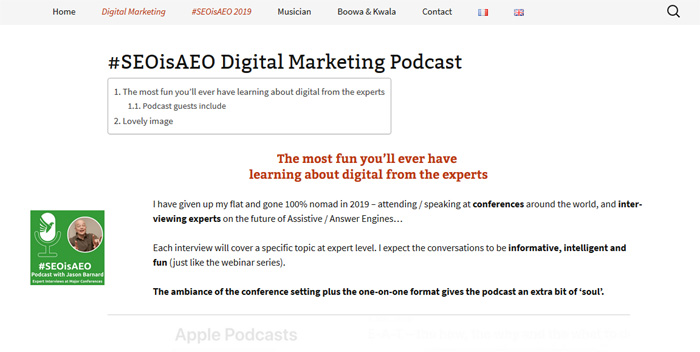.png)
You've just launched a new website—maybe your very first.
Where do you go to earn your first backlinks?
Sure, creating quality content and stellar UX is a must, but you need to generate links if you want your new website to rank.
The good news is that there are some easy and powerful link building strategies you can use right away, without having to wait for your site and your reputation to grow first.
I'll show you exactly how to build backlinks for a new website with six of these strategies below.
Keep reading to get your backlink profile started with a bang!
1. Copy Your Competitors' Strategies
Believe it or not, the best way to get started building links for your website is to look at your competitors. The goal is to try and understand what strategies they're using, and then replicate the best ones for your own site.
There are two things to analyze here:
1. How your competitor has been linked
For each linking page, look at the corresponding Trust Flow and Citation Flow to identify the most reputable websites in the list.
Open these sites in a new browser tab and find out how your competitor got their link from the site. Maybe it was a guest post, a resource page, an interview or a roundup.
This should give you plenty of ideas for tactics that worked successfully for your competition!
2. What kind of content has been linked
You should also pay attention to the kinds of content your competitor has created to earn backlinks.
For example, you might see that most links go to pages that host statistics or case studies. Or, maybe expert roundups and posts about trending industry topics are really critical.
Focus on creating the types of content that do well for your competitors, as they're more likely to do well for you. Just make sure that all the content you add to the web is unique, original and something that only you can bring to the table.
2. Leverage YouTube and Its Wide Audience
Videos are a big thing nowadays, huh?
According to HubSpot, 78% of people watch videos online every week, and a good 55% do so every day.
And because YouTube is the second largest search engine in the world—after only Google, and owned by Google anyway—with 1 billion hours of video views per day, Google itself will give YouTube more authority than other platforms. So, having backlinks from YouTube works.
James Robinson, Marketing Adviser at Iconic Genius, agrees. These are his tips:
"The key to success is to use keywords in your video, tag, description and thumbnail. In fact, you also want to link to other relevant YouTube videos that match your keywords.
But that’s just the start. Having a video ranked on the first page of Google makes your content more easily digestible to the user."
So it would be a good idea to create a YouTube video for all your most important content, and co-promote the two channels.
However, James also warns that you avoid going after keywords that big brands compete for, but focus on local keywords instead.
You can read our guide on YouTube SEO for more guidance on this strategy.
3. Create a Podcast and Make It Easy to Join
Ever thought of creating a podcast for your website? It's a great way to get involved with the community in your industry and get backlinks.
As an example, check out the #SEOisAEO podcast from Jason Barnard.

It's critical that you make your podcast easy to join, so include guidelines for potential guests and make it clear that you'll publish a transcription of your podcast and will need a photo, short bio and website URL (if any) from the guest.
Podcasts are not very difficult to create and you can distribute them across multiple platforms where you can also get additional backlinks for creating a profile.
A few places to get you started:
So it's a double win! You get backlinks from the distribution platforms (they still matter even when they're nofollowed), and then from anyone who appreciates and shares the podcast from there.
4. Use HARO and SourceBottle
Even I—a slow writer with a passion for SEO and tons of chronic health issues—managed to score a handful of great backlinks through HARO!
So why can't you do the same?
It's very easy to get backlinks from journalistic platforms like HARO and SourceBottle. All you have to do is sign up for the free emails that they send you every day or every week, and respond to relevant media queries for quotes that will be published on a variety of websites.
Many times the writer or journalist will tell you that you'll be featured on the website, and they'll ask you for a headshot and a URL (hello, backlink!).
Other times you have to do some research: Maybe all they've given you is the name of their publication and you have to Google it to find out if they even give backlinks.
My recommendation here is to schedule some time every week to respond to relevant queries, because it's a very time-consuming task to do to a high quality and to include all the information that the journalist asks of you. For example, they may want screenshots or stories, and you may have to collect data.
So it makes sense to add query responses to your weekly calendar.
5. Local Link Building
Starting closer to where you're located is always a good idea in every type of business.
Even more so when it comes to link building, and if you're a business owner or company with a physical location.
This is the tactic that Sarkis Hakopdjanian, Director of Strategy and Principal for The Business Clinic, uses at his agency when they launch a new website for a client and start building links.
He's kindly laid out their two-step process below:
a. Citations for local SEO
"When looking for a local service provider, 90% of people use major search engines, like Google. These searches usually have 'local intent,' so most of the time they’re looking through Google Maps.
The top ranking factor for Google Maps is having a complete and accurate Google My Business citation. This is a free service that any business owner can register for and they’re able to manage their business profile on Google Maps.
In addition to their Google My Business citation, Google’s algorithms also analyze the quality and quantity of backlinks from citation sources."
Sarkis gave me his top eight citation sources that, in his experience, Google particularly appreciates and helped increase his clients' rankings in Google Maps:
The go-to strategy here is to create a profile (with citation) on these platforms to score a great set of local SEO backlinks.
b. Link building for local SEO
After creating citations, Sarkis's next step is to create a valuable, link-worthy resource and start building links to it. For example, that resource might be a comprehensive article, an e-book or research findings.
Bringing original and data-based content to the industry is what makes the difference here.
Sarkis added a story to illustrate this point:
"One of our clients owns a dental practice and we manage their content marketing and blog writing. We recently wrote a blog article on teeth whitening that’s been very popular.
We reached out to local bloggers that manage health, wellness and lifestyle blogs and invited them to point a link to our blog article for the interest of their readers.
Many of them have started pointing links to our article, simply because they feel their audience would find the article valuable and helpful."
6. Give Out Scholarships
If you're a larger company or you can rely on a big budget, you certainly can (and should!) aim higher for your new website's first backlinks.
This link building strategy can be very successful even when nobody knows of your brand yet, which typically means fewer people will want to link to your content (mainly for lack of trust).
Hosting a local scholarship will help boost your domain strength and reputation as well as attract backlinks from authoritative sources, including EDU sites.
To do this, set a budget for your scholarship ($500 or $1,000 will do), and create a page on your website for the scholarship with all the information people will need to apply for it.
Reach out to local high schools or universities to inform them that you're offering a scholarship their students might be interested in, and give them a link to your page.
Need some inspiration? Check out the scholarship pages from GEICO and McDonald's. You can also get more ideas from Scholarships.com.
Building Backlinks for New Websites Wrap-up
Building backlinks for a new website is not that difficult if you schedule regular time for it.
Link building should be a part of your marketing tasks, so if you can set some time aside for it every week or every month, you won't have to obsess over it.
Now go get started and enjoy seeing your website grow in rankings, traffic and conversions!










